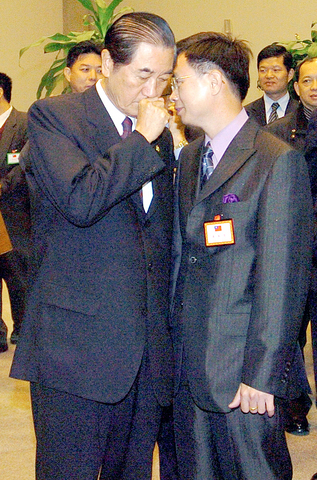Premier-designate Su Tseng-chang (蘇貞昌) yesterday announced a slew of further appointments for his new Cabinet as political pundits sought to determine what, if anything, the changes would mean for domestic and cross-strait policy.
Su also insisted he would not become the president's "executive director," in an apparent move to allay concerns raised by a former DPP chairman that President Chen Shui-bian (陳水扁) would keep Su on a short leash.
Presidential Office Deputy Secretary-General James Huang (黃志芳) will take over from Minister of Foreign Affairs Mark Chen (陳唐山), reports said yesterday. Mark Chen is expected to be the next Presidential Office secretary-general.

PHOTO: CHU PEI-HSIUNG, TAIPEI TIMES
Meanwhile, Government Information Office Minister Pasuya Yao (
Su also announced that Chiu Kun-liang (邱坤良), the current president of the Taipei National University of the Arts, will become Council for Cultural Affairs minister.
Su's remarks yesterday were seen as a move to address concerns from former DPP chairman Lin I-hsiung (林義雄) that Su may play the same limited role as as predecessor Frank Hsieh (謝長廷), because the president may treat him like an executive director, leaving him little room to maneuver.
Lin, who was DPP chairman from 1998 to 2000, released an open letter on Saturday calling on the president and the future premier to follow the model prescribed in the Constitution that governs their interaction.
Lin also suggested that the president keep a proper distance from Cabinet members and top executives of state-owned enterprises. He blamed the unstable administrative system of the past five years on the DPP government's failure to follow the principles set forth in the Constitution.
Meanwhile, the opposition questioned the new Cabinet's ability to have any significant impact, saying the picks reflected Chen's interests.
Legislator Pan Wei-kang (潘維剛), a KMT legislative caucus whip, said the KMT was disappointed that ideology was still the main concern in Cabinet appointments.
She said the KMT particularly regretted the retention of Minister of Education Tu Cheng-sheng (
Pan added that Tu's educational reform plan had led nowhere, and that as a man obsessed with ideology, he was simply unfit for the job.
"Although Tu has adopted a relatively low profile recently, that does not mean he has changed his mentality and beliefs," she said.
The KMT whip also said that if reports about James Huang becoming the new foreign minister are accurate, it would be another indication that the president wanted someone he could trust to carry out his plans on the diplomatic front.
She added that the opposition would not expect much from the next Cabinet, which is to be sworn in on Wednesday, because Su has already said he would carry out the president's new policy of "active management, effective opening" on cross-strait relations.
Su has retained 12 Cabinet members and replaced nine.
Also see story and editorial:

NATIONAL SECURITY THREAT: An official said that Guan Guan’s comments had gone beyond the threshold of free speech, as she advocated for the destruction of the ROC China-born media influencer Guan Guan’s (關關) residency permit has been revoked for repeatedly posting pro-China content that threatens national security, the National Immigration Agency said yesterday. Guan Guan has said many controversial things in her videos posted to Douyin (抖音), including “the red flag will soon be painted all over Taiwan” and “Taiwan is an inseparable part of China,” while expressing hope for expedited “reunification.” The agency received multiple reports alleging that Guan Guan had advocated for armed reunification last year. After investigating, the agency last month issued a notice requiring her to appear and account for her actions. Guan Guan appeared as required,

A strong cold air mass is expected to arrive tonight, bringing a change in weather and a drop in temperature, the Central Weather Administration (CWA) said. The coldest time would be early on Thursday morning, with temperatures in some areas dipping as low as 8°C, it said. Daytime highs yesterday were 22°C to 24°C in northern and eastern Taiwan, and about 25°C to 28°C in the central and southern regions, it said. However, nighttime lows would dip to about 15°C to 16°C in central and northern Taiwan as well as the northeast, and 17°C to 19°C elsewhere, it said. Tropical Storm Nokaen, currently

‘NATO-PLUS’: ‘Our strategic partners in the Indo-Pacific are facing increasing aggression by the Chinese Communist Party,’ US Representative Rob Wittman said The US House of Representatives on Monday released its version of the Consolidated Appropriations Act, which includes US$1.15 billion to support security cooperation with Taiwan. The omnibus act, covering US$1.2 trillion of spending, allocates US$1 billion for the Taiwan Security Cooperation Initiative, as well as US$150 million for the replacement of defense articles and reimbursement of defense services provided to Taiwan. The fund allocations were based on the US National Defense Authorization Act for fiscal 2026 that was passed by the US Congress last month and authorized up to US$1 billion to the US Defense Security Cooperation Agency in support of the

PAPERS, PLEASE: The gang exploited the high value of the passports, selling them at inflated prices to Chinese buyers, who would treat them as ‘invisibility cloaks’ The Yilan District Court has handed four members of a syndicate prison terms ranging from one year and two months to two years and two months for their involvement in a scheme to purchase Taiwanese passports and resell them abroad at a massive markup. A Chinese human smuggling syndicate purchased Taiwanese passports through local criminal networks, exploiting the passports’ visa-free travel privileges to turn a profit of more than 20 times the original price, the court said. Such criminal organizations enable people to impersonate Taiwanese when entering and exiting Taiwan and other countries, undermining social order and the credibility of the nation’s